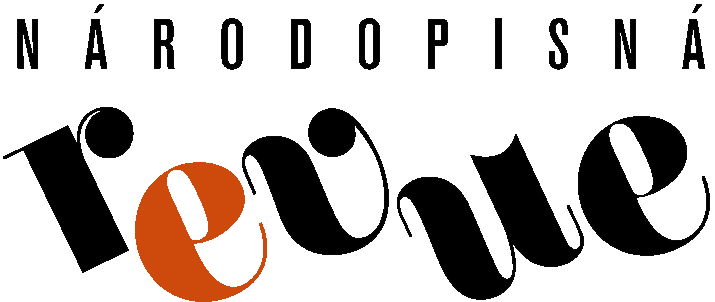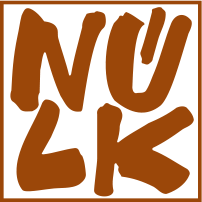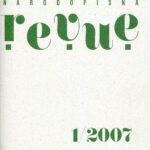Journal of Ethnography 1/2007 pays its attention especially to the drama in folk tradition. Jaroslav Blecha introduces puppetry as a part of folk theatre culture („Theatrum cum pimperlis“ and inheritance of the famous marionetteer ́s Kopecký family at the collection of The Moravian Museum in Brno); Juraj Hamar analyses the typology of characters of puppet theatre (On personal characters identity and vocal expression at folk puppet theatre). Petra Richterová devotes herself to the phenomenon of amateur theatricals in the first half of the 20th century (Village amateur theatricals near Kardašova Řečice and its position in traditional folk culture). Marta Ulrychová has aimed her essay at renewed Passion Plays in Hořice in Šumava (Passion Plays in Hořice – an example of renewed tradition). Martin Šimša in his contribution writes about Whitsun King’s Ride whose unpublished description was at the inheritance of collector and researcher František Bartoš („Age-old Habit on Kings“ – Whitsun ride-about in Mysločovice and its context). The text by Katarína Popelková and Juraj Zajonc concerning the elaboration of so-called Wollman’s Archives touches the wider Slovakian tradition. Wollman’s Archives is a voluminous collection of text which originated between 1928 – 1947 based on terrain collections done by the students of the Faculty of Arts in Bratislava under leadership of Prof. Frank Wollman.
The section Fotografické zastavení (Stopping with Photos) introduces the pictures of harvest thanksgiving in Petrov, District of Hodonín (Harvest Thanksgiving 1928 – Among folk habits, theatre stage and political manifestation), Transferring Tradition column brings the contribution by Eva Večerková Feast in Černovice, near Kunštát – celebration, habit, theatre, play. The Society Chronicle remembers the anniversaries of two Czech ethnomusicologists – Jiří Traxler (born 1946) and Lubomír Tyllner (born 1946). It brings also the memories of Jan Miroslav Krist (1932 – 2007), the personality of folk dance and folklore movement. In other regular sections, the reports of conferences and professional events, festivals, concerts and reviews of new book and CD editions have been published.
„Theatrum cum pimperlis“ and inheritance of the famous marionetteer ́s Kopecký family at the collection of The Moravian Museum in Brno
The touring marionette theatre of so-called folk puppeteers represents a unique chapter in the history of Czech theatre. It was the first and almost only Czech theatre form that the Czech countryside could learn about. At the collection of the Department of the history of theatre, there are deposited documents on the work of one of the most popular Czech marionetteer ́s dynasties, the Kopecký family. The collection includes more-generation inventory of the theatres of Karel and Václav who lived in Brno. Václav, who was younger than Karel, maintained – illegally - the tradition of touring marionetteering even in the 1970s. By inheritance, the marionettes of various origins, made by a lot of wood-carvers have been handed down. Along with photos, papers and other original documents, they represent a unique inheritance for the historiography of the Czech marionette theatre.
On personal characters identity and vocal expression at folk puppet theatre
The personal identity of traditional characters at folk puppet theatre is a complex of three mutually connected layers: the semantic, the optical and the auditory ones. The author pays his attention mostly to the auditory layer, which – in addition to the acoustic objectification of text – also represents emotional, social, psychological and language features of a character. They actualize themselves on the paralinguistic level. Thus, they take a significant part in the total poetics and aesthetics of folk puppet theatre. The text is a part of the research on folk puppeteers vocal expression, which the author has been implementing since 2004, namely in co-operation with Milan Rusek from the Institute of Informatics of the Slovak Academy of Sciences in Bratislava. The basic material consists mainly of the recordings of traditional plays by puppeteer Bohuslav Anderle (1913 – 1976). Those recordings were taped by his son Anton (1944), the last traditional puppeteer in Slovakia, in 1971. As an illustration in conclusion, the author mentions a brief characteristics of personal identity for traditional characters taking part in the performance Don Juan in the repertoire of B. Anderle.
Village amateur theatricals near Kardašova Řečice and its position in traditional folk culture
Amateur theatricals as a phenomenon of Czech countryside has been mentioned since the 19th century where it was created parallel to traditional theatre whose elements have been safeguarded especially in annual and family habits for the longest time. The essay is aimed at amateur theatricals in some selected villages (Doňov, Újezd and Záhoří) nearby Kardašova Řečice in South Bohemia, especially in the period between two world wars. Based on archive documents and manuscripts, the essay features activity of the clubs being engaged in theatre, it reconstructs the period theatre repertoire, the methods of studying the theatre plays and their presentation, the drama performances, the personalities of actors, directors and other participants, the influences of professional theatre. In conclusion, the essay compares the tokens of amateur theatricals with folk theatricals.
Passion Plays in Hořice – an example of renewed tradition
The entry freely linking to the essay printed at NR in 2005, deals with the Passion Plays renewed tradition in Šumava within the after-war period, i.e. from 1945 until now. The author pays a special attention to the after-1989 restoration of almost forgotten inheritance. The restoration of Passion Plays, being played not in German but in Czech language now, is resulting from the co-operation of a group established around the first after-revolutionary Mayor of Hořice, Miroslav Čunát. Among the members of that group were Jindřich Pecka, historian from České Budějovice, Jaroslav Krček, composer, and Antonín Bašta, movie director from České Budějovice. First night of the new Czech version accompanied with recorded music by Musica Bohemica, took place on 29 June 1993. The entry remembers the attendance of cultural life’s important personalities, the theme elaboration in form of documentaries and the permanent exhibition in the local school building.
„Age-old Habit on Kings“ – a Whitsun ride-about in Mysločovice and its context
The essay is focused on a voluminous manuscript by the popular scripturist F. Zelinka from the village Louky u Zlína. The material represents new possibilities in researching the countryside culture of the second half of the 19th century because it not only descri- bes some annual habits but also depicts every-day life at the local pasturage and records some local legends. The chapter Age- -old Habit on Kings makes known with some circumstances and the course of Whitsun King’s ride in Mysločovice at the periphery of the Haná region. The description is concentrated on the outside form, it passes over the details, and the endeavor to give a true picture of functions within a social milieu of the community is fully strange to it. The importance of realized details rises mainly within the context of other reports on Whitsun King’s rides within the Moravian milieu, which the author gives in the text.
Electronic catalogue of Wollman’s Archives: the actual condition of its elaboration
The entry matter is the fund of text documents that has been kept under the name Wollman’s Archives at the Instute of Ethnology of the Slovak Academy of Sciences in Bratislava. The corpus of texts originated between 1928 and 1947 as a result of terrain collection in the territory of Slovakia. The collections were done by students of the Slavic Seminar of the Faculty of Arts of the former Slovak University (later Komenský University) in Bratislava and by some students of the Faculty of Arts in Brno. The first part of the entry summarizes the knowledge concerning the origin and hitherto processing, but also understanding and presentation of the fund. The second part contains first experience and results resulting from the archives elaboration as well as from the electronic form of Wollman’s Archives between 2005 and 2006. With the above procedures, the general methodical process of analysis and processing the written documents into the form of electronic database has been verified. The Wollman’s Archives itself has been processed with the aim to extend its availability and utilization – not only within the study of folklore, but also within the material, spiritual and social culture, the history of traditional culture study or the language and history.



